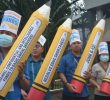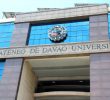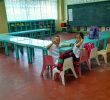by RUBY ANNE R. PASCUA
www.ofwjournalism.net
MANILA � IN THIS school, students are allowed to stare across the window to daydream during classes.
That�s how some students like Cathyrine Tamayo and Ginesa Patalinhog get their motivation to stay out of the streets and stay in this school called Erda Tech.
For Tamayo and Patalinhog, both 17 years old, their dreams bring them to the places where their fathers are: thousands of miles overseas.
But instead of feeling sorry because of the separation and over the poverty that pushed their fathers to leave for work abroad, the two are allowed to express their dreams through creative means.
Tamayo loves to paint, using watercolor as medium. Patalinhog does, too. She is also a member of the school�s dance club while both are part of a group of young artists.
Erda administrator Wilhelmina Martinez said the school�s program called Palihan (workshop, in English) has been effective through such method of tapping into the students� creativity because �we are also cultivating in them their personality and work attitude.�
�We found out that if we give adequate skills preparation to these children, mold them to have the right work attitude and have them all geared up to work hand-in-hand with other people, they will really be ready for employment,� Martinez added.
In a country where the number of high school dropouts and out-of-school youth are increasing in numbers, Erda Tech offers a fresh take in training young people like Tamayo and Patalinhog to traverse the social costs of the country�s overseas labor export program.
A study by F. K. Coronel and F. Unterreiner for the United Nations Children Fund cited that because �migration involves the separation of one or both parents from their children �therefore [it] goes against the best interest of the children.�
The paper titled �Towards a greater impact of remittances on children�s rights realization,� estimates that there are �about 3.75 million (Filipino) children left behind by their fathers.�
�These yield a total of 5.25 million children left behind by migrant mothers and fathers,� the paper, released last May, said.
Bricks
ACCORDING to Coronel and Unterreiner, while �it may seem easy to assume that [migrant workers�] remittances positively impact children�s rights realization such as education and health, there is actually no conclusive data, nor definite findings to support this assumption.�
Indeed, citing a 2003 study by nonprofit advocate Ildefonso Bagasao, the two noted that only a percent of the remittances sent by the parent working abroad goes to education, the rest to consumption or payment of debts.
Erda Tech, established in 1993 by Catholic priest Fr. Pierre Tritz of the Society of Jesus, witnessed this condition in their areas: the low middle-income Manila locales Pandacan and Paco.
According to Martinez, Erda Tech administrator and Palihan program manager, most of the beneficiaries of the project in these two locales have one or both parents working abroad.
Hence, ten years ago, the school launched the Palihan project, which is a free non-formal training for children who grew into teenage life on the streets and out of school.
One of them is the five-foot tall Tamayo who worries that her father who is working abroad as a painter couldn�t fund her plans of getting a college diploma.
Hence, she applied for and was accepted for the Palihan project through which she and friend Patalinhog are trying to gain skills in computer technology.
�I was not yet born when my father went to Japan for work. As I recall, our first ever meeting took place when I was already five years old, when he went back here for a vacation,� she said.
OFWS & Migration, Pinoy Life Abroad









